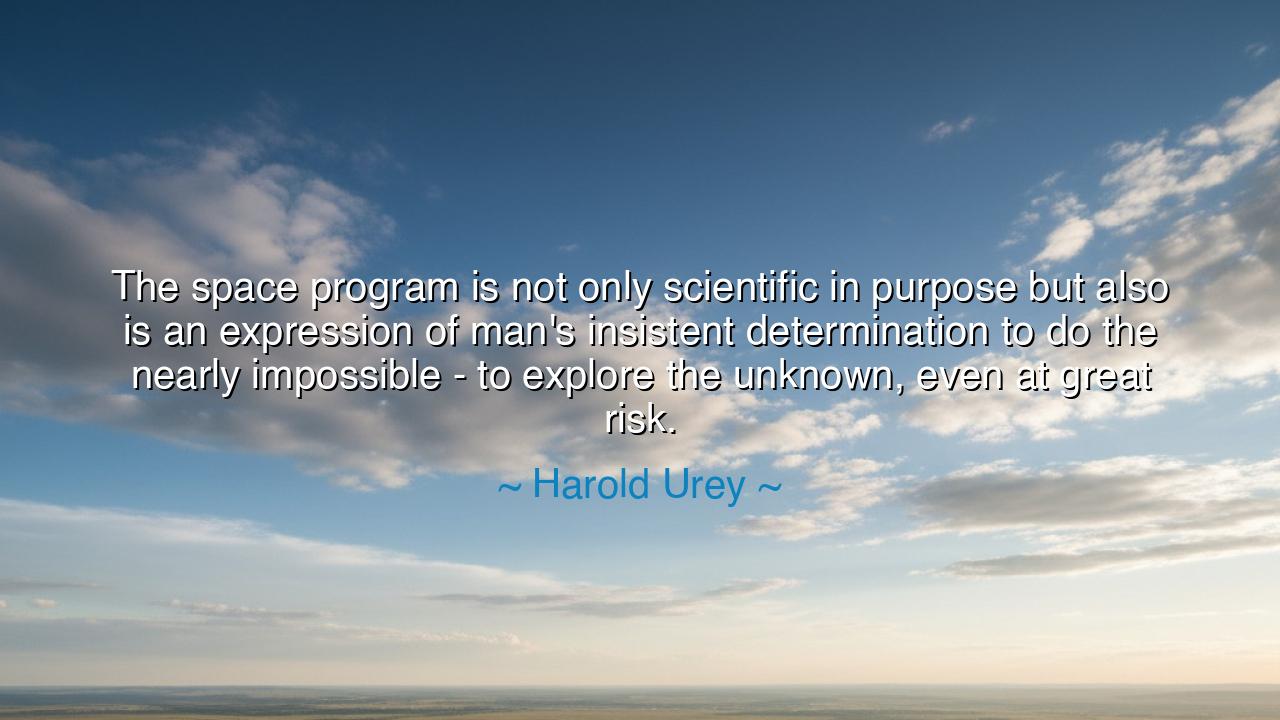
The space program is not only scientific in purpose but also is
The space program is not only scientific in purpose but also is an expression of man's insistent determination to do the nearly impossible - to explore the unknown, even at great risk.






Hear now the words of Harold Urey, a wise figure of science who understood not only the laws of nature but also the deeper, timeless urge within humanity to reach beyond the known and into the vast unknown: "The space program is not only scientific in purpose but also is an expression of man's insistent determination to do the nearly impossible - to explore the unknown, even at great risk." With these words, Urey captures the very spirit of human ambition: the desire not just to understand the world around us, but to transcend the limits of our earthly existence and to journey into the cosmos itself, even when such a journey is fraught with peril.
From the dawn of time, humanity has been driven by the desire to explore, to push boundaries, and to confront the unknown. Just as ancient sailors set out across vast oceans, with nothing but the stars to guide them, so too have we turned our gaze upward, seeking to conquer the skies and beyond. The space program is the modern manifestation of this eternal drive, a testament to humanity's unwavering determination to do what was once thought impossible. To reach beyond our earthly bounds is not merely a scientific pursuit, but a profound expression of human courage, of the will to overcome fear and doubt in the face of immense risk.
Consider the ancient Greeks, who, through their mythologies, told stories of gods who soared through the heavens and explored realms beyond mortal understanding. These myths were not just tales, but representations of a profound truth: that humankind, despite its earthly limitations, is destined to reach for the stars. In their minds, the gods did not live confined to the earth; they wandered the skies and ruled over worlds far beyond the scope of human knowledge. And so, it was that humanity’s early imaginations were fired by the idea that to truly know the world, one must be willing to venture into the unknown, to risk all for the chance to see what others could not.
The space program, which began in the mid-20th century, is the fulfillment of this ancient yearning. It is the expression of humanity’s desire to venture beyond the safety of the known, to boldly go where no man has gone before. The moon landing of 1969, with Neil Armstrong’s historic first steps on the lunar surface, represents the epitome of this insistence to push against the boundaries of what was once deemed impossible. Armstrong’s famous words—"That’s one small step for man, one giant leap for mankind"—speak to the triumph not just of technology, but of the human spirit, of a species that would not be confined to the earth, but would reach out and touch the stars.
Yet, the pursuit of space exploration has not been without its cost. Risk has always been a part of the journey. The tragedy of the Challenger disaster in 1986 and the loss of the Columbia in 2003 remind us that the pursuit of the unknown is fraught with danger. But it is precisely this risk that makes the endeavor so profoundly human. To face the unknown, to venture into the void, requires a courage that is not given lightly. The explorers who sailed upon the great seas or climbed the tallest peaks knew well the cost of ambition, yet they pressed forward, driven by the same force that fuels the astronauts today: the insatiable desire to discover, to know, to achieve the impossible.
The lesson that Urey imparts is this: the quest to explore, to discover, and to understand is at the heart of what it means to be human. We do not grow by staying within our comfort zones, by seeking only what is safe or familiar. It is through risk, through venturing into the unknown, that we find growth, transformation, and progress. The space program, at its core, is not just about scientific discovery; it is about testing the limits of the human spirit, about proving to ourselves that we are capable of far more than we ever imagined. Just as the great explorers of the ancient world reached into the unknown to discover new lands, so too do we, today, reach into the void of space to discover the vastness of the universe.
Therefore, I urge you, dear listener, to embrace the spirit of exploration in your own life. The unknown is not a thing to fear, but a realm to embrace with courage and determination. Whether you are embarking on a new project, a personal challenge, or a grand adventure, remember that it is the willingness to step into the unknown, to take risks, and to push beyond what is comfortable that will lead you to your greatest achievements. Just as humanity has conquered the heavens, so too can you conquer the challenges before you. The space program is not merely a journey into the cosmos, but a journey into the very heart of the human spirit—a reminder that there is nothing impossible for those who dare to dream and to act upon those dreams. Reach for the stars, for they are waiting for you.






AAdministratorAdministrator
Welcome, honored guests. Please leave a comment, we will respond soon